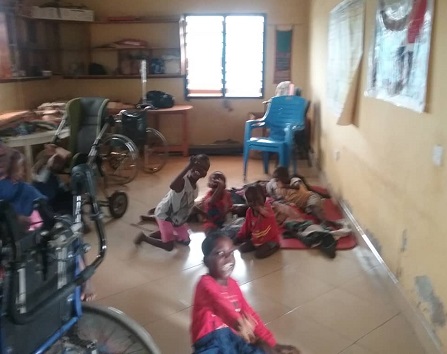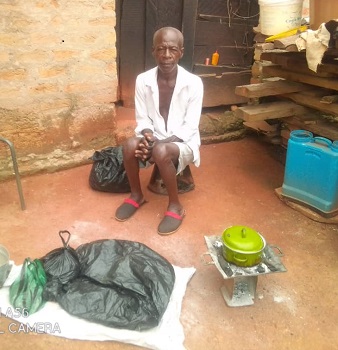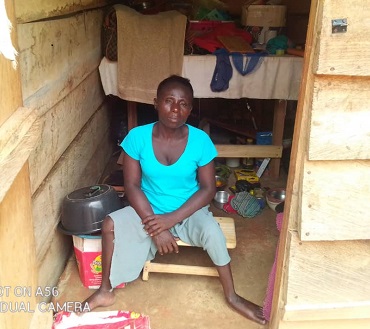
COVID-19 impact on vulnerable groups in Bono Region, Ghana
Squatting on a thick dark wooden structure serving as a temporary single room apartment, in a low income urban community, sixty-four-year old, Benjamin Opoku Kwaku, musician, guitarist and a farmer is fully living out high hopes and aspirations of expanding his small holder farm entity into a viable commercial venture.
At his left hand side on the ground, are logs of teak woods brought from his farm decently packed in front of his uncompleted house. He plans to use this stockpile kept at his home base for the past three years, to finish his uncompleted brick building.
Advertisement
“I took delivery of these woods to complete my house. You can earn between Ghc500 or ($87) to Ghc700 or ($122) when you sell them. It’s more profitable than the money I get from selling my farm produce,” he says.
Underneath the pile of wood is a black coal pot with lighted charcoal. On top of the hot coal sits a green silverware with corn, it is being cooked for breakfast. Smoke billows out of the cover lid. Very close to the coal pot is an aluminum ware with beans spread out in the open kissing rays of the late morning sun.
“My beans was given to me as a gift by a certain lady. I will just have to throw one scoop deep into my mouth after the corn is cooked and wait for what the next day has for me,” he points out smiling.
Opoku Kwaku is determined to face challenges ahead, redeem lost glory
Not worried and never bogged down by his current state and circumstances, he’s completely resolved in mind to fight to regain a lost glory. Until something miraculously happens, Opoku Kwaku’s entire life’s path is slammed to deprivation, destitution, distress, distraction, dependency and relying on hand outs from friends, relatives and close associates.
Yet twenty-five years ago, he had hopped from one country to the other performing musical shows and concerts in Nigeria, where he had played for late popular Afro Pop Star, Fela Kuti, Togo, Benin, Cameroun and Senegal.
“I left Ghana at age 15 sojourning in these places for 25 years. When I had played in Nigeria alone I had earned good income,” he narrates.
Urban poor elderlies struggle to access utility services
In this vulnerable condition, access to social services and utility benefits such as health, water and electricity which constitutes basic human rights appears to be a major challenge to many elders in this area. Often such groups have riden on the generosity and benevolence of other influential persons in the community notably a Minister of State, a Municipal/District Chief Executive or a Member of Parliament (MP).
Social interventions reduce hardship of poor people
The introduction of such human centred and pro poor policies by the Kuffour regime was timely and vital because, as he had already observed, not much is earned as proceeds from the sale of farm produce or harvest by many poor urban farmers. They don’t earn much to live decent lives – to own a car, a home or any other landed property.
No setting up of hand washing station against Covid in community
Buildings in the community where Mr Opoku Kwaku lives are separated three meters apart by untarred street. Across the streets and far apart, it’s difficult to find hand washing stations set up in the households, encouraging strict compliance to enhanced hygiene and World Health Organisation (WHO) protocols against the deadly pandemic, very peculiar and characteristic in certain quarters.
“I have only one nose mask for my farm and another given to me by my junior brother’s wife, she sewed. I wash and wear them always,” Opoku Kwaku chides.
But fighting a Covid 19 pandemic that spreads incredibly fast among a large group of people, requires the use of more than two irreplaceable face masks as weapons in a poor man’s arsenal against a dreaded disease. Full compliment of protective gear is required.
Yet Opoku Kwaku does not appear to be weighed down with the lack of this personal protective essentials. He is even more eager, and sounds passionate to go to church this coming Sunday, to perform at musical concerts where hundreds will gather to worship with few masks, and no social distance, heightening the risk of Covid infections.
His plight as a poor elderly farmer is further exacerbated by the very fact that he can’t enjoy government’s Livelihood Empowerment Against Poor(LEAP) Programme currently as an urban city dweller, a cash transfer initiative to assist poorest households in Ghana with basic needs, including food, health and education.
In general terms, he is just a year shy of qualifying and enjoying the programme which is specifically designed to cater for orphans and vulnerable children, aged (65years and above), severely disabled who cannot work, very poor pregnant women and infants below the age of one year. He is disqualified because he is a poor elderly urban dweller.
Though his entire life hangs in seclusion, but unburdened with the responsibility of caring for a large family, he stands to benefit from government’s policy intervention in the near future if membership of the programme is extended to cover poor elderly urban dwellers. As to when exactly the membership increment will come into effect remains a puzzle yet to be solved.
“We currently work with 45 communities in the Municipality, government intends to scale up coverage of the programme to include poor people in urban centres. That will come into effect when we are given the greenlight,” Mr Owusu Sekyere, Dormaa Central Municipal Director, Department of Social Welfare remarks.
He dismisses strongly arguments and suggestions that cash transfer is done on the basis of one’s political inclination.
Physically challenged Dr. Anto’s Clinic slightly feels effects of pandemic
Approximately 10 minutes drive from Sunyani, the Bono Regional Capital to Abesim, sitting on the fringes of the Sunyani-Kumasi Road is RAFCHIK Clinic, a privately owned health facility run by a physically challenged man, Dr. Raphael R. Anto, a medical consultant with 26 years of work experience. He has his left leg amputated and has an artificial one to support.
As an essential physically challenged medical practitioner, economically, the global pandemic had little impact on the operations of his two story plush Clinic. Apart from forcing extra cost in medical expenditure and bills, none of the staff of his hospital experienced pay cuts or had to be laid off.
“We have been operating with full staff strength since lockdown was announced in March when the country recorded first two cases. The only difference between the pre Covid era and now is that operational cost has slightly increased while payment of National Health Insurance premium by the government to my Clinic remains the same.
“We spend every month between Ghc 400 ($77) to Ghc 450($86) buying Covid 19 health and safety items hand sanitisers, towel tissue and face masks, things the insurance premium doesn’t make up for in extra expenses,” he laments.
To check corruption, there are stringent measures laid out which ensures staff monitors each other’s activities to check the pilfering of the Covid 19 health and safety items. This is extremely vital as the quantity of protective equipment procured is very limited.
“I do not interfere with distribution process for the Covid items. I’m a human being and can abuse the power under my discretion. An administrator is in charge of this and there are checks and balances to ensure he does so fairly. Our Association have not received any complaints from members the pandemic has drastically or harshly affected the running of their Hospitals,” he adds.
Dr Anto admits that state support for his Clinic in the supply of protective equipment isn’t always forthcoming and very minimal. Recent supplies have been from the Sunyani Municipal Health Directorate and the Member of Parliament (MP) for the area.
Covid 19 pandemic generally affects businesses of vulnerable persons in Bono Region
The effect of the pandemic on the businesses and jobs of other physically challenged persons and other vulnerable members in the area has been extraordinarily disturbing.
Most of them are now peeved, bitter and disappointed particularly with their leaders, though they generally sought their welfare, for lack of transparency. Specifically, in the disbursement of their share of the District Assembly Common Fund (DACF).
Augustina Adjeiwaa, 43, a cripple, who walks with the aid of crutches but has no formal education. She has a 16-year-old son and works hair plaiting. She acknowledges the difficult these days in making ends meet, shifting blame on the new style of women’s hairdo, this new way has forced her out of business due to lack of skill.
Not only this, part of the reason is she had quit her business over lack of financial support from friends, close associates and relatives, attributing this to the impact of Covid 19 on their businesses. They can’t simply make enough money to support her.
At the time of visit around 0130hours, Adjeiwaa and her family relative had just lit up fire to charcoal in a stove to prepare ampesi, a local delicacy made from boiled yam and plantain to have breakfast, their first meal of the day. The plantain and yams were given to them as gift from someone.
A wooden structure, a home they live in formerly a dressmaker’s shop now serves as their living room, a bedroom and a kitchen simultaneously.
Adjeiwaa reveals that the pandemic has amplified the voices of vulnerable and weaknesses of poor persons lamenting state support has been woefully inadequate for people in the minority and vulnerable members of society.
“Since March when government announced lockdown, I was given one face mask, and even with the hand sanitisers we were asked to bring a bottle into which small quantities were poured in for our use,” she adds.
Many of these vulnerable groups feel they have been denied what rightly belongs to them, something, they have made formal request and appeal to on many occasions, citing partisan considerations.
“Adjeiwaa notes that since the previous Mahama regime when she last received allocation of shares from the Fund, she has never received again.
“I can buy a fridge to sell iced water and an aluminium container to sell confectioneries, candies, drinks and biscuits to support my livelihood if I had been given my share,” she remarks.
Mr Gyamfi Yeboah, Secretary, Ghana Federation of Disabled, Dormaa Central Municipal, dismisses allegations of partisanship in the distribution of Covid 19 items and allocation of financial resources, the DACF.
He explains delays in the release of the disabled share of the District Assemblies Common Fund (DACF), membership of the Federation far outweighs the financial resources made available, and failure for members to attend meetings regularly are some of the factors which accounted for why some members had received money and others did not.
“Partisan consideration are not attached in this scheme of things. The Municipal Assembly gave us only 1 gallon of hand sanitiser and 20 face masks during lockdown. We have received none ever since,” he added.
In May, government in collaboration with the National Board for Small Scale Industries (NBBSI), Business and Trade Associations and selected Commercial and Rural Banks, rolled out a soft loan scheme up to a total of Gh¢ 600 million or $105, 263,with one year moratorium and two year repayment period for micro, small and medium scale businesses.
Ghanaians since July have enjoyed free electricity, water as part of the package to support the masses following Covid 19 outbreak. The rolling out of this initiative generated controversies in the media with some members of the public making claims, complaints and questioning how the directive was been implemented as others were not benefiting.
Agbega says ‘physically challenge persons were not consciously targeted during lockdown’.
Mr Christopher Agbega, Covid 19 Project Officer, Ghana Federation of Disabled Organisation, had argued that though there was a number of interventions announced by government during lockdown, there wasn’t a conscious effort to include people with disabilities.
“Some had faced serious challenges accessing food banks mounted by government at certain places. Physically challenged persons have - general health complications, in their dietary requirement and were unable to access location where food was being distributed.
“Not all people with disabilities at the district level benefited from the food distribution administered by the National Council for People With Disabilities through the Ministry of Children and Gender Affairs,” he explains.
For people who are physically challenged entrepreneurs whose businesses were affected by Covid 19 pandemic the Federation wrote to the Executive Director of the National Board for Small Scale (NBSSI) to discuss the applications of such persons on the need to prioritise and support them to access loans or grants made available by government through the Covid 19 Alleviation Fund.
“This arrangement was restricted to only physically challenged persons who operated businesses,” Mr. Agbega adds.
The Federation faces a challenge in trying to get members to understand the mechanism pertaining to the allocation of their share of the DACF, but they hope to overcome this challenge by empowering members.
Children with Cerebral Palsy (CP) at Cosmos Centre need support against Covid
At the Cosmos Centre for Children with Special Needs, a Non-Profit organization, children aged between two and 19 years live with Cerebral Palsy (CP), a condition that makes walking difficult.
They warmed up to me as I inched closer to them. In a coronavirus era, and very typical of such children you would not expect them to be observing social distancing rules in their incapacitated state, except guided by their caretakers in hand washing and alcohol hand rub.
It prickled my conscience, I became more and more worried for them and myself mingling casually in various playful activities. What if one of the children had Covid 19 without showing symptoms, a question that bothered my mind as I approached them? I finally mustered courage, stretch out hands of love to touch and felt them. They were lively and heartwarming.
“Sometimes I get frightened to wits, they might contract this virus,” Mr Joseph Ankamah, Caretaker of the Home intimates. In a separate room at the Home used as a learning centre, the Caretaker shows me some pieces of door mat woven by the children.
He expresses deep worry, however, that there is extremely little financial and material assistance from individuals in the community, philanthropist and organizations to support the children. There’s lack of parental care, love and child neglect.
Parental love eludes them as their parent and guardians hardly find time to visit them at the Home. In some ways keeping them at the Centre has greatly helped reduce stigmatization, child neglect, discrimination and marginalization in a culture that regard them as ‘children of the sea’.
The home offers some form of social protection away from parent who have come to dump them, and seem to have forgotten them. The discrimination, neglect, marginalization and stigmatization suffered by the children has been fueled by the belief and fears from indigenes of the community that they might get infected with same disease that the children are suffering when they come close to them.
“The reality is that each other week we spend Gh¢ 500 or ($87) in purchasing pampers/diapers for 16 out of the 19 children at the Centre,” the Caretaker adds.
Dr. Akoto calls for a change in the narrative
But Dr. Elliot Akoto, a Paediatrician at Ansu Ababio Paediatric Centre (AAPC), Dormaa Presbyterian Hospital, points out though people with some chronic medical conditions are at increased risk of bad outcomes from Covid, cerebral palsy per se does not make the children more vulnerable.
He said the risk is probably the same as for healthy children except that because they are dependent on others for their day to day survival like feeding, bathing and even moving around frequent close contact and dependence on care takers may make them more exposed.
He argues further that the critical issues which deserves focus and awareness raising mainly has to do with the capacity to provide for their overall financial and material needs that guarantees a healthy, sustainable way of living for these vulnerable children. This indirectly reduces their risk of contracting Covid.
“Individuals, philanthropist, corporate organizations and the entire community must unite and buy into that idea,” he suggested



